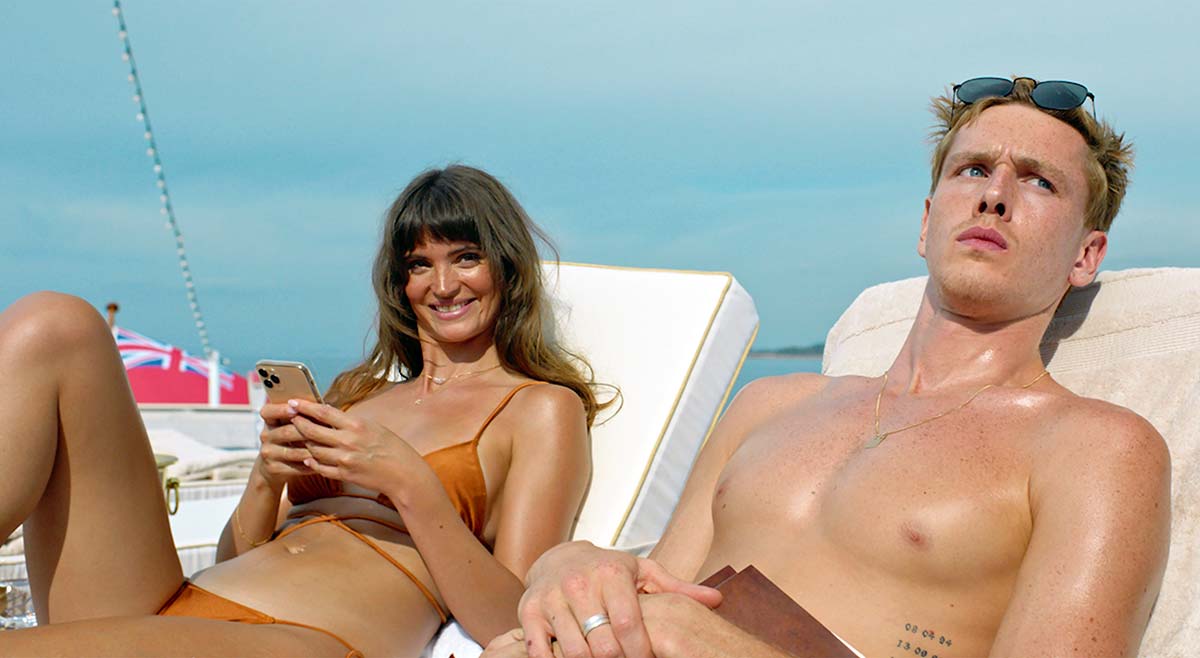It’s one of modern life’s most beguiling paradoxes that social media influencers are, of course, the scum of the earth, and yet the pop culture skewering them always plays so uncharitably that a viewer feels compelled to defend the indefensible. Ruben Östlund comes out swinging against Instagrammers in the first third of his new film “Triangle of Sadness,” which joins a pair of logged-on models after a casting-call prologue introducing us to the chiseled Carl (Harris Dickinson, cementing his place in the next generation of movie stars).
READ MORE: Cannes Film Festival 2022 Preview: 25 Must-See Films To Watch
He and girlfriend Yaya (Charlbi Dean) make a living by posing and posting — her more lucratively than him, as she’s perfectly willing to state aloud during an awkward settling of the bill at a tony restaurant. She’s petty, shallow, vindictive, and worst of all, she snaps a selfie with a bowl of pasta from which she declines to take a single bite. Without an anchor of humanity to match Carl’s sympathetic insecurity, her existence comes across as one big cheap shot from the man feeding her words.
She’s just one of the low-hanging fruits clutched at by a satire with ideas as huge and hollow as the hull of the luxury ocean liner on which the second third is set. Carl and Yaya board the formerly Aristotle Onassis-owned Christina O for an invite-only cruise catering to the megarich, which capsizes and strands a handful of passengers on a deserted island. Along the way, the film itself takes us on a sightseeing tour of softball themes, starting with the vapidity of the fashion industry (“EVERYONE IS EQUAL,” proclaims the backdrop of a show walked by the usual lineup of zero-fat adonises) to the grand questions of capital and power.
In the past, Östlund has shown a deft facility in sending up meaty topics, applying granular attention to male ego in “Force Majeure” and art-world pretensions with “The Square.” Here, however, he stoops to the broadness ascribed to his work by its harshest critics, now more parody of himself than parodist.
He’s got his mind on money and money on his mind — what having it does to those with lots of it and how they react when they can no longer throw it around. The ship hosts a coterie of wealthy grotesques, including a Russian manure magnate, a British war-toy profiteer, and the kind of meek, woman-averse dork sure to have made his nut off big tech. Carl and Yaya may not be titans of industry, but they fit right in with their air of barely muted contempt for everyone else. The patrons get their jollies by bandying about the control they wield over the staff, whether getting them fired for minor infractions or forcing them to playact leisure so that those exploiting the labor can assuage their guilt. And even within the below-deck underclass, there are tiers; the outward-facing white employees score tips and perks inaccessible to the multiethnic janitorial staff.

While it’s hardly breaking news that the moneyed elite are gargantuan a-holes, that’s only the first half of Östlund’s equation. The variables are all swapped once things get “Swept Away,” as custodian Abigail (Dolly De Leon) realizes that her ability to fish, make a fire, and perform basic acts of self-sufficiency places her at the top of the upended hierarchy. Before long, she’s grown into a mini-tyrant, extorting sex from Carl — his good looks now the most meaningful form of currency in circulation — in exchange for food.
If the gist is that absolute power corrupts absolutely, okay, sure, though that’s an equally pat observation. But Östlund frames his structure of authority in explicit political terms, with the ship’s Marxist captain (Woody Harrelson, in and out of the film far too quickly) going quotation-for-quotation against the capitalist fertilizer tycoon until they’re all just interchangeable catchphrases. Put into practice, the notion that the proletariat will be just as monstrous as the bourgeoisie if afforded the chance lapses into the pointless both-sides cynicism last seen in “New Order.”
Two and a half long, often tedious hours perk up only at sparse intervals, generally when the superb Dickinson plays his handsomeness suggesting vapidity against the anxious churn inside of Carl. And there’s some admirable physical comedy in the leadup to the capsizing, as if the climax of “Titanic” had been doused in puke and diarrhea. Even so, these diversions do little to redeem the underdeveloped social analysis that Östlund won’t stop hammering.
One may wonder where he fits into this equal-opportunity superiority, as he gets his potshots in from the sidelines of a conflict he views at a distance. Ironically enough, he avails himself of the greatest privilege of all: the comfort of treating class as a thought experiment to be gamed however he sees fit. The filmmaker worked at tony Alpine ski resorts in his post-grad years, presumably serving the same nouveau-riche boors lampooned here. Not that a viewer would surmise that much by the arch detachment from the faction of people who would’ve once qualified as his peers. [C-]
Follow along with all our coverage from the 2022 Cannes Film Festival.






